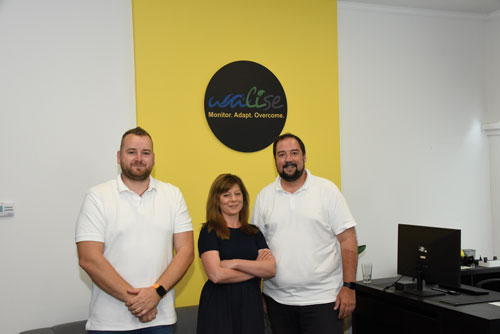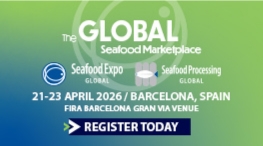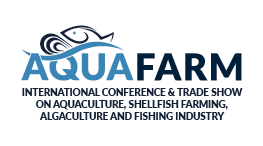This article was featured in Eurofish Magazine 5 2025.
With its electronics-filled buoys a Hungarian company is bringing the pond fish farming sector into the digital world.
Walise, short for Water and Life Services, is a Hungarian company founded to address the increasingly urgent challenges facing aquaculture in pond fish farms. Based in Kaposvár, Walise has in just a few years established itself as an innovative provider of automated water quality profiling and intervention systems.
The company’s origins lie in another business called Embedded Systems Hungary (ESH), which had been active for many years designing specialised hardware solutions across a wide range of sectors, from medical devices to railway ticketing machines. As Tibor Koleszár, Walise’s founder, explains, ESH functioned as a project company, solving one-off engineering problems for clients. But when the economic climate worsened and customers could no longer invest in development, the team looked to their own ideas. One of these had been gathering dust for more than a decade: a concept for water monitoring buoys.
Mr Koleszár’s personal interest in fishing and sailing meant that water had always held his attention, but he lacked the biological knowledge to know what to measure or why. The turning point came when he met a hydrobiologist specialising in fisheries ecology. He explained that climate change was creating acute problems in lakes and fish farms, from declining oxygen levels to harmful algal blooms. Mr Koleszár and his colleagues could build the technology; the hydrobiologist could define the ecological questions. Their partnership gave birth to the first automated Profiling Measurement Unit, or PMU, around 2015.
Building practical solutions for aquaculture
The PMU was a large, heavy device, weighing up to 240 kg. It was difficult and costly to deploy, requiring special equipment to lower it into the water. Realising that customers would need something more practical, the team redesigned it to be modular and transportable. Newer versions weigh from 2 to 85 kilograms and can be taken apart for easy transport in an ordinary vehicle. From these beginnings, Walise has developed a range of monitoring solutions. The PMU is still the flagship, capable of profiling water quality down to 20 metres, recording conditions at different depths to reveal stratification that can be invisible at the surface. A smaller version, the Shallow Measurement Unit or SMU, caters for shallower bodies of water, measuring just a couple of metres deep. There is also the Fixed Measurement Unit, or FMU, a compact, solar-powered station that can be installed on a shoreline to monitor not only water but also soil and air parameters.
All devices feed into Walise’s cloud-based platform. This system was originally conceived as an “early warning” tool for fish farms. Customers receive real-time notifications when parameters such as oxygen concentration or temperature cross critical thresholds. Over time, the platform has evolved into something more sophisticated. It now allows automated control of equipment such as aerators, pumps, and sluice gates. Farmers can set conditional rules so that, for example, if oxygen drops below a set point during a hot, still night, the system can activate aeration without human intervention.
Educating farmers and building trust
A major challenge Walise has had to confront is customer education. Many Hungarian fish farms historically relied only on handheld thermometers or dissolved oxygen meters, if at all. Farmers often believed that surface conditions represented the whole pond. Walise’s equipment revealed sharp differences in oxygen levels between layers, or striking variations between two ponds only metres apart, due to differences in sediment or algae. The data sometimes contradicted farmers’ instincts, leading to scepticism. Typical calls to the company began with complaints that sensors must be faulty, only for handheld checks to confirm the readings. Once farmers became accustomed to the wealth of data and learned how to interpret it, many went on to purchase additional units.

Three of the company’s models: from left, the CMU is for fixed depth measurements at 40 cm making it ideal for shallow lakes and rivers; the Shallow Measurement Unit (SMU) is used in water around 2 m deep; while the
Profiling Measurement Unit (PMU) can be deployed in water up to 20 m deep.
This need for guidance has led Walise to work closely with universities, biologists, and associations such as the Hungarian Fishing Association (MOHOSZ). The company not only supplies equipment but also offers data interpretation, consultancy, and training. Real value lies in understanding what to do with data and Mr Koleszár expresses an ambition to develop educational resources so that knowledge can spread more widely. For Walise, raising awareness is as important as making sales. The company’s clients so far are concentrated in Hungary, with a handful of installations in Serbia. Their model has been to build personal relationships, visiting each site, studying the layout of ponds, and recommending a tailored configuration. In 2024, Walise began expanding abroad through Energofish, a Hungarian distributor with an established European network. The company presented at EFTTEX 2025, the European fishing tackle trade exhibition in Brussels, and has attracted interest from feed companies such as Aller Aqua, who see potential in monitoring to optimise feeding strategies.
Innovation for a changing climate
Walise’s philosophy is encapsulated in its slogan: “Monitor, Adapt, Overcome.” By monitoring, farmers gain a true picture of their waters. By adapting, they can make timely interventions. By overcoming, they prevent stock losses and maintain productivity even under stress. In an era when droughts, heatwaves, and extreme weather are becoming more frequent in Central Europe, such tools are moving from optional to essential.

The buoys are equipped with sensors that monitor a range of values including temperature, oxygen content of
the water, phytoplankton levels, pH and other critical parameters (blue-green algae, ammonia, etc.).
The company continues to innovate. It is developing solar powered “airlifter” devices to circulate the water in stratified ponds without the need for external power supplies. It is working on an autonomous boat, akin to a water drone, that can travel across large ponds to map conditions in real time. It is even testing systems to capture and analyse greenhouse gases emitted from water bodies. At the same time, the design of the buoys themselves has been refined to reduce maintenance: sensors retract out of the water when idle, so they need cleaning only once a month, saving labour. Cost remains a consideration, but Walise has positioned its products as affordable compared with large-scale marine monitoring systems designed for oceans. A full-featured PMU costs around €15,000, while the smaller SMU is about €6,500. For many farmers, this is a serious investment, but one that can be offset by avoiding catastrophic fish kills.
Climate change impacts make monitoring systems invaluable
The adoption of Walise’s systems also speaks to broader environmental concerns. Hungary, like much of Europe, is facing declining water levels and rising temperatures. In some regions, ponds have run nearly dry in midsummer. In others, fertiliser runoff from adjacent fields has worsened water quality. By capturing data in such varied conditions, Walise is building not only a commercial product but also a scientific resource. Customers generally agree that their anonymised data may be used for research, helping to build a picture of climate impacts on inland waters.
Though the company is small, with only around eight employees, its network of partners and collaborators extends widely. Manufacturing of parts is handled in Kaposvár and nearby workshops, with assembly completed in-house. Software development, analytical work, and biological expertise are pooled from both employees and external specialists. This lean model allows Walise to remain agile while tackling complex problems and may enable its devices to become a fixture not only in Hungary but across Europe in the years to come.









